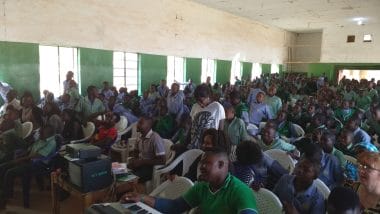
Feb 24, 2017 | Focolare Worldwide
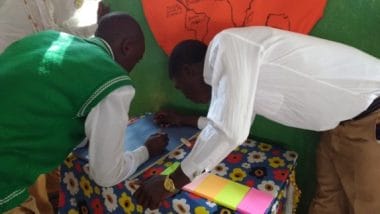 For three days, St Joseph’s College transformed into a fraternity experiment. The young students, ages 9 to 18, lived side by side with their professors, their families, as well as many other young people, adults and elderly from other cities. The Mariapolis was organised by members of the local Jos community, as well as other communities like that of Abuja (4 hours away) and Onitsa (12). There were also some young people of the Focolare from Lagos. In Nigeria, a country of seemingly limitless expanses, long trips bristling with danger often need to be overcome. Yet this did not stop anyone from supporting the Mariapolis at St. Joseph’s. The school opened its gates to welcome the young and not so young, students, teachers, workers. Among the Mariapolites was John Maigari, who had once attended and taught at the school. Now retired, Maigari also previously headed the diocese’s department of education. Many years prior he himself had experienced Mariapolis life, where each person sees each other as family to love and to serve. Now after many years, the professor hoped that the students could experience that same lifestyle. His proposal was welcomed.
For three days, St Joseph’s College transformed into a fraternity experiment. The young students, ages 9 to 18, lived side by side with their professors, their families, as well as many other young people, adults and elderly from other cities. The Mariapolis was organised by members of the local Jos community, as well as other communities like that of Abuja (4 hours away) and Onitsa (12). There were also some young people of the Focolare from Lagos. In Nigeria, a country of seemingly limitless expanses, long trips bristling with danger often need to be overcome. Yet this did not stop anyone from supporting the Mariapolis at St. Joseph’s. The school opened its gates to welcome the young and not so young, students, teachers, workers. Among the Mariapolites was John Maigari, who had once attended and taught at the school. Now retired, Maigari also previously headed the diocese’s department of education. Many years prior he himself had experienced Mariapolis life, where each person sees each other as family to love and to serve. Now after many years, the professor hoped that the students could experience that same lifestyle. His proposal was welcomed. 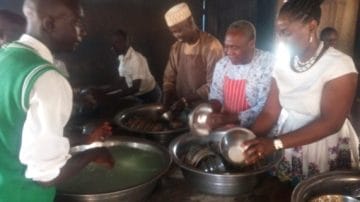 For three days, the school completely changed. Moments of reflection and going in depth were joined with tangible experiences. Divided into groups, students of different ages lived side by side with teachers and those attending, sharing the various moments of the day: cooking, washing dishes, tidying up the meeting hall, cleaning toilets and the school playground. For some it was their first time; they had never done anything like it. Even the school’s principal washed dishes! A large book was prepared for the students to capture their comments. It tells of three days of true living. The retreat changed their lives, they say. “The unity we lived during those days struck us from the very first moment that you set foot in our school.” It was a unity that the words of Chiara Lubich and the witness of the Focolare members had transmitted to them.
For three days, the school completely changed. Moments of reflection and going in depth were joined with tangible experiences. Divided into groups, students of different ages lived side by side with teachers and those attending, sharing the various moments of the day: cooking, washing dishes, tidying up the meeting hall, cleaning toilets and the school playground. For some it was their first time; they had never done anything like it. Even the school’s principal washed dishes! A large book was prepared for the students to capture their comments. It tells of three days of true living. The retreat changed their lives, they say. “The unity we lived during those days struck us from the very first moment that you set foot in our school.” It was a unity that the words of Chiara Lubich and the witness of the Focolare members had transmitted to them.  “I feel really happy and enthusiastic,” writes Nipps, “because these days were wonderful. I experienced many things and was particularly struck by the love and unity that the team of people who ran the program had between them.” “Before my life was incomplete,” says Keivin, “because I didn’t feel at all that God truly existed and was alive. Now I truly believe in God.” “This retreat wasn’t like the others,” adds Daong. “You ate with us and slept at our high school.” In this part of Nigeria, for years there have been many episodes of violence between Christians and Muslims, with seeds of hatred sown across the country. These young students also had lived through this. At the Mariapolis at Jos, they were able to experience an alternative: the firepower of God’s love and unity.
“I feel really happy and enthusiastic,” writes Nipps, “because these days were wonderful. I experienced many things and was particularly struck by the love and unity that the team of people who ran the program had between them.” “Before my life was incomplete,” says Keivin, “because I didn’t feel at all that God truly existed and was alive. Now I truly believe in God.” “This retreat wasn’t like the others,” adds Daong. “You ate with us and slept at our high school.” In this part of Nigeria, for years there have been many episodes of violence between Christians and Muslims, with seeds of hatred sown across the country. These young students also had lived through this. At the Mariapolis at Jos, they were able to experience an alternative: the firepower of God’s love and unity.
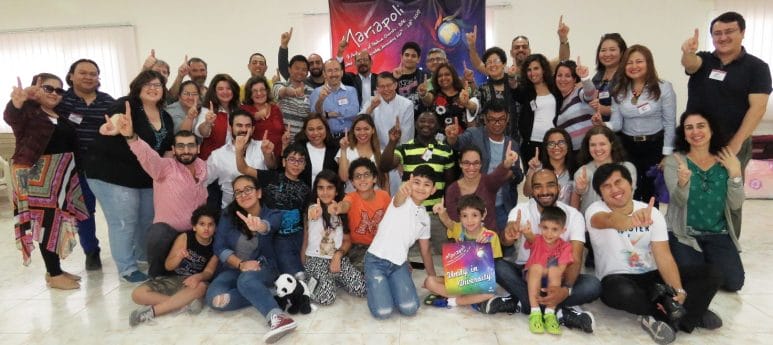
Feb 22, 2017 | Focolare Worldwide
 “We find ourselves here in countries of the United Arab Emirates due to work,” Claudia says. “Our workplaces are often strongly competitive, and it is difficult to integrate because there is little time for relationships that are simple and authentic. “The Catholic Church in Dubai is young, lively, joyous and not overly complicated. More than 2,000 faithful participate in and focus on daily mass – mostly from the Philippines, Pakistan and India. “Our local Focolare community is also made up mostly of migrants, and we try to give witness to the Gospel in the circles we move through, bringing love and unity around us. There are many who know about and live the spirituality of unity after first hearing about it in their home countries. We try to propose it to those whom we’re close to as a remedy to the frenetic, individualistic life here. “For us the monthly Word of Life meeting is fundamentally important. We read it together and try to go deeper into its meaning, sharing experiences that emerge from putting it into practice. “Maria Voce and Jesus Moran’s trip to India in January 2016 gave us a new drive to bring the ideal of unity to many, staying closely networked together.” “So we naturally involved all the people we’re in contact with to live the Mariapolis experience, which we took great care in preparing,” explains Amjad. “On January 27–28, 65 people from 12 countries (4 from the Middle East, the rest from Pakistan, the Philippines, Brazil, Japan, Italy and Cameroon) decided to come together at Ras Al Khaimah, an emirate near Dubai, to experience our first Mariapolis in these lands. “Emotions were running high! For some it seemed like a dream come true to finally get together after such a long time. We were welcomed by the parish of Father Willy, who is originally from the Philippines. The theme we chose, ‘Unity in diversity,’ reflected the reality and challenges that we all live through really well.” “What really struck me,” writes a young person from India,” was what we heard from Chiara Lubich about the ‘technique’ of building unity. Now I’d like to practice it.”“To discover how Jesus, in the moment he felt forsaken by the Father, can become a ‘key to unity’ in as much as I try to imitate him, filled me with hope,” said a woman from the Philippines. In a joyous atmosphere, participants were able to tell of their joys and difficulties, both in the hall and smaller groups, which is so important in order to share our lives together. There were moments to play, pray, and an intercultural evening to relax that included songs, video clips, skits and dances that involved everyone. “Special care was given to activities for the children, some of whom did not want to go back home,” says Claudia. “It was like an oasis,” explains Amjad, “where each of us found a family, with a spiritual presence of Jesus that is alive.” “During these past days, the fire of this ideal, which I got to know many years ago, was re-awakened,” confides a man from Brazil. “Now I want to give this fire to others.” Mia and Michel write: “It seemed to us that by the end, everyone returning to their countries or emirates, like Oman, Qatar, Bahrain, brought with them that ‘piece of fraternity’ that they had lived at the Mariapolis. Everyone evidently wanted to continue living this in their own environment, bringing hope to everyone. Now we keep connected through social media in a vibrant network, trying to help us live for each other, open to everyone.”
“We find ourselves here in countries of the United Arab Emirates due to work,” Claudia says. “Our workplaces are often strongly competitive, and it is difficult to integrate because there is little time for relationships that are simple and authentic. “The Catholic Church in Dubai is young, lively, joyous and not overly complicated. More than 2,000 faithful participate in and focus on daily mass – mostly from the Philippines, Pakistan and India. “Our local Focolare community is also made up mostly of migrants, and we try to give witness to the Gospel in the circles we move through, bringing love and unity around us. There are many who know about and live the spirituality of unity after first hearing about it in their home countries. We try to propose it to those whom we’re close to as a remedy to the frenetic, individualistic life here. “For us the monthly Word of Life meeting is fundamentally important. We read it together and try to go deeper into its meaning, sharing experiences that emerge from putting it into practice. “Maria Voce and Jesus Moran’s trip to India in January 2016 gave us a new drive to bring the ideal of unity to many, staying closely networked together.” “So we naturally involved all the people we’re in contact with to live the Mariapolis experience, which we took great care in preparing,” explains Amjad. “On January 27–28, 65 people from 12 countries (4 from the Middle East, the rest from Pakistan, the Philippines, Brazil, Japan, Italy and Cameroon) decided to come together at Ras Al Khaimah, an emirate near Dubai, to experience our first Mariapolis in these lands. “Emotions were running high! For some it seemed like a dream come true to finally get together after such a long time. We were welcomed by the parish of Father Willy, who is originally from the Philippines. The theme we chose, ‘Unity in diversity,’ reflected the reality and challenges that we all live through really well.” “What really struck me,” writes a young person from India,” was what we heard from Chiara Lubich about the ‘technique’ of building unity. Now I’d like to practice it.”“To discover how Jesus, in the moment he felt forsaken by the Father, can become a ‘key to unity’ in as much as I try to imitate him, filled me with hope,” said a woman from the Philippines. In a joyous atmosphere, participants were able to tell of their joys and difficulties, both in the hall and smaller groups, which is so important in order to share our lives together. There were moments to play, pray, and an intercultural evening to relax that included songs, video clips, skits and dances that involved everyone. “Special care was given to activities for the children, some of whom did not want to go back home,” says Claudia. “It was like an oasis,” explains Amjad, “where each of us found a family, with a spiritual presence of Jesus that is alive.” “During these past days, the fire of this ideal, which I got to know many years ago, was re-awakened,” confides a man from Brazil. “Now I want to give this fire to others.” Mia and Michel write: “It seemed to us that by the end, everyone returning to their countries or emirates, like Oman, Qatar, Bahrain, brought with them that ‘piece of fraternity’ that they had lived at the Mariapolis. Everyone evidently wanted to continue living this in their own environment, bringing hope to everyone. Now we keep connected through social media in a vibrant network, trying to help us live for each other, open to everyone.”
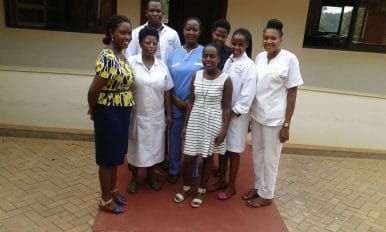
Feb 20, 2017 | Focolare Worldwide
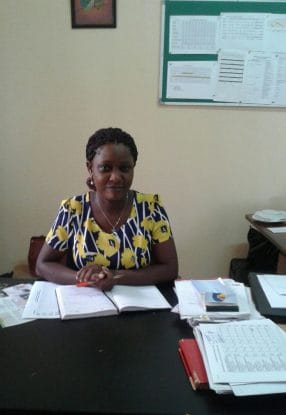 Ugandan business woman Rita Najjingo was among the 1,200 business owners and researchers of economy who were welcomed by Pope Francis on February 4, twenty five years from the start of the Economy of Communion Project (EoC). Seventy three percent of Rita’s country is made up of young people between the ages of 18 and 30, 47% of whom are unemployed. “Many of them try to set up small manufacturing activities,” Rita reports, “but because of a lack of capital and management skills, their businesses fail from start.” The idea of the EoC came to the African continent in recent years and immediately appeared as an answer. In 2015 several Ugandan entrepreneurs and researchers took part in a conference in Nairobi, Kenya, to learn about this economic project that puts the person first. When they went back to Uganda they talked with the local community and the first projects began in Ibanda, the western part of the country with a form of micro-credit that began to support a school for ex-cons; in Lira, the north, a home was built for elderly women, along with the cultivation of garlic, and so on. In Kampala,” Rita recounts, “there was the idea of involving the patients at a neary Focolare-run health centre which had a secure source of income. The idea was to be able to grant loans with their savings that they put in common, with loans for people who did not have enough capital to start up a manufacturing activity. An expert gave a week-long course and a savings and loan association was begun.
Ugandan business woman Rita Najjingo was among the 1,200 business owners and researchers of economy who were welcomed by Pope Francis on February 4, twenty five years from the start of the Economy of Communion Project (EoC). Seventy three percent of Rita’s country is made up of young people between the ages of 18 and 30, 47% of whom are unemployed. “Many of them try to set up small manufacturing activities,” Rita reports, “but because of a lack of capital and management skills, their businesses fail from start.” The idea of the EoC came to the African continent in recent years and immediately appeared as an answer. In 2015 several Ugandan entrepreneurs and researchers took part in a conference in Nairobi, Kenya, to learn about this economic project that puts the person first. When they went back to Uganda they talked with the local community and the first projects began in Ibanda, the western part of the country with a form of micro-credit that began to support a school for ex-cons; in Lira, the north, a home was built for elderly women, along with the cultivation of garlic, and so on. In Kampala,” Rita recounts, “there was the idea of involving the patients at a neary Focolare-run health centre which had a secure source of income. The idea was to be able to grant loans with their savings that they put in common, with loans for people who did not have enough capital to start up a manufacturing activity. An expert gave a week-long course and a savings and loan association was begun.  Typically the amount that is given in loan is never more than three times the capital the applican has on hand. The repayment starts after four weeks, leaving a small percentage for the increase of the share capital. Within three months, the debt is fully repaid. In granting a loan the promoter group enquires about the type of business that applicants intend to start, giving advice and accompanying them in their first steps. Over time, a group of experts in management has been formed that can also offer advice on managing, marketing and sustainability. One person asked for the loan to make handcrafted bags, another young person to buy a motorcycle he could rent out and also drive for pay, with a second loan and the sale of the old bike, he bought a more efficient one. He is now in charge of buying and selling used motorbikes, with help of two young men whom he hired. A member of the community has invested the loan in the purchase of sesame plants that are sold for various food uses. He too has been able to hire young people who help in delivery and removal of goods, thus facilitating things for manufacturers. With this loan activity, Rita continued, she was also able to create a fully registered company in charge of stationary and office supplies. After having used up the first loan, I got another to expand the business with online money transfers. Currently, I have four centres that have hired 4 young women, 3 of whom are single mothers.” A motorbike, small house, some garlic and sesame seeds . . . small signs, Pope Francis called them, in his speech to the EoC, seeds of change: “Change in the order of the spirit and therefore of life are not linked to big numbers. The little flock, the lamp, the coin, a ring, a pearl, some salt, leaven: these are the images of the Kingdom that we find in the Gospel. It doesn’t take many people to change our history, our life.” (Vatican City, February 4, 2017)
Typically the amount that is given in loan is never more than three times the capital the applican has on hand. The repayment starts after four weeks, leaving a small percentage for the increase of the share capital. Within three months, the debt is fully repaid. In granting a loan the promoter group enquires about the type of business that applicants intend to start, giving advice and accompanying them in their first steps. Over time, a group of experts in management has been formed that can also offer advice on managing, marketing and sustainability. One person asked for the loan to make handcrafted bags, another young person to buy a motorcycle he could rent out and also drive for pay, with a second loan and the sale of the old bike, he bought a more efficient one. He is now in charge of buying and selling used motorbikes, with help of two young men whom he hired. A member of the community has invested the loan in the purchase of sesame plants that are sold for various food uses. He too has been able to hire young people who help in delivery and removal of goods, thus facilitating things for manufacturers. With this loan activity, Rita continued, she was also able to create a fully registered company in charge of stationary and office supplies. After having used up the first loan, I got another to expand the business with online money transfers. Currently, I have four centres that have hired 4 young women, 3 of whom are single mothers.” A motorbike, small house, some garlic and sesame seeds . . . small signs, Pope Francis called them, in his speech to the EoC, seeds of change: “Change in the order of the spirit and therefore of life are not linked to big numbers. The little flock, the lamp, the coin, a ring, a pearl, some salt, leaven: these are the images of the Kingdom that we find in the Gospel. It doesn’t take many people to change our history, our life.” (Vatican City, February 4, 2017)
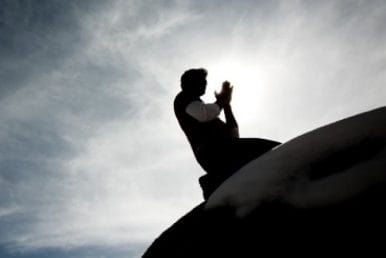
Feb 9, 2017 | Focolare Worldwide
 I was about to finish high school. I have been fascinated by Africa ever since I was a child, and especially when I would listen to the tales of my uncle, a missionary in Congo. I didn’t like the bourgeoisie lifestyle of Belgian society, and the poverty and social injustices diffused in the world. I was interested in the philosophy of Julius Nyerere (whose beatification process is now underway), the first President of Tanzania. His concept of Ujamaa (in Swahili meaning ‘being a family’) was at the base of the socioeconomic development policies which in Tanzania had brought about the construction of a pacific coexistence between tribes and ethnic groups, after Great Britain had granted independence. His thoughts were based on African traditions and examples of the first Christian communities described in the Acts of the Apostles. I applied to enter the White Fathers congregation, not so much due to a vocational choice, but because they worked in Tanzania. We agreed to do a year of acquaintance. Once I got to their mother house at the Lovanio University (Belgium), without their knowing it I had started to take part in an extremely leftist Maoist group. We would organize initiatives in favour of the third-world countries and for the independence of Angola and Mozambique. During a demonstration, the police found my name on one of the fliers and came to interrogate me. I thought that it would be better to change my path completely. Furthermore I was disappointed in my friends, since only I was paying the price of our actions. Instead, the spiritual director invited me to stay and meet a group of students that held monthly meetings in the convent. I had seen them fleetingly, and they seemed to have their minds in the clouds; they spoke of Jesus and the Gospel. But I accepted the invitation. The first time I participated in one of their meetings, I listened in silence. They recounted of how they tried to put the Gospel into practice. In the end they asked me what I thought. «The Gospel has existed for two thousand years, and the world is still full of injustice, exploitation and oppression.» One of them answered: «If you want to change the world, start from yourself.» I didn’t know how to reply. I asked, «From where?» He put the “Word of Life” of that month in my hand: «Do not judge and you will not be judged.» The next day, as much as I tried, I found myself always judging the others. This was not my piece of bread. I went back to meet them, to say that it was impossible not to judge. They exhorted me not to get discouraged and to try again after every failure. I returned home, and prayed to Jesus in the Eucharist: «If You want me to live in this way, help me, since I can’t do anything alone.» When the school year passed, I was sure that the Fathers would ask me to leave. Instead they told me that they had noticed a change in me, and if I wanted, I could start in the novitiate. Through frequent contact with those youths, the gen who lived the communion of good among themselves, and with the help of the Focolare director in Belgium, I found my path and became a missionary. Living for the others gave immense joy and this was how I discovered the great ideal of unity of Chiara Lubich and the Movement. Before leaving for Africa in 1982 I was ordained a priest. The biggest challenge was that of seeking deep dialogue with the local people and practising the art of “making yourself one.” I studied their language and the local culture, to make the people’s customs my very own. I experienced that in the light of the Gospel, all that is beautiful, good and true is raised to a higher level, and the rest slowly disappears.
I was about to finish high school. I have been fascinated by Africa ever since I was a child, and especially when I would listen to the tales of my uncle, a missionary in Congo. I didn’t like the bourgeoisie lifestyle of Belgian society, and the poverty and social injustices diffused in the world. I was interested in the philosophy of Julius Nyerere (whose beatification process is now underway), the first President of Tanzania. His concept of Ujamaa (in Swahili meaning ‘being a family’) was at the base of the socioeconomic development policies which in Tanzania had brought about the construction of a pacific coexistence between tribes and ethnic groups, after Great Britain had granted independence. His thoughts were based on African traditions and examples of the first Christian communities described in the Acts of the Apostles. I applied to enter the White Fathers congregation, not so much due to a vocational choice, but because they worked in Tanzania. We agreed to do a year of acquaintance. Once I got to their mother house at the Lovanio University (Belgium), without their knowing it I had started to take part in an extremely leftist Maoist group. We would organize initiatives in favour of the third-world countries and for the independence of Angola and Mozambique. During a demonstration, the police found my name on one of the fliers and came to interrogate me. I thought that it would be better to change my path completely. Furthermore I was disappointed in my friends, since only I was paying the price of our actions. Instead, the spiritual director invited me to stay and meet a group of students that held monthly meetings in the convent. I had seen them fleetingly, and they seemed to have their minds in the clouds; they spoke of Jesus and the Gospel. But I accepted the invitation. The first time I participated in one of their meetings, I listened in silence. They recounted of how they tried to put the Gospel into practice. In the end they asked me what I thought. «The Gospel has existed for two thousand years, and the world is still full of injustice, exploitation and oppression.» One of them answered: «If you want to change the world, start from yourself.» I didn’t know how to reply. I asked, «From where?» He put the “Word of Life” of that month in my hand: «Do not judge and you will not be judged.» The next day, as much as I tried, I found myself always judging the others. This was not my piece of bread. I went back to meet them, to say that it was impossible not to judge. They exhorted me not to get discouraged and to try again after every failure. I returned home, and prayed to Jesus in the Eucharist: «If You want me to live in this way, help me, since I can’t do anything alone.» When the school year passed, I was sure that the Fathers would ask me to leave. Instead they told me that they had noticed a change in me, and if I wanted, I could start in the novitiate. Through frequent contact with those youths, the gen who lived the communion of good among themselves, and with the help of the Focolare director in Belgium, I found my path and became a missionary. Living for the others gave immense joy and this was how I discovered the great ideal of unity of Chiara Lubich and the Movement. Before leaving for Africa in 1982 I was ordained a priest. The biggest challenge was that of seeking deep dialogue with the local people and practising the art of “making yourself one.” I studied their language and the local culture, to make the people’s customs my very own. I experienced that in the light of the Gospel, all that is beautiful, good and true is raised to a higher level, and the rest slowly disappears.
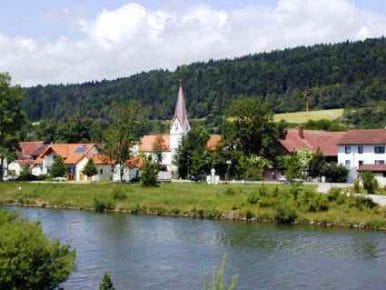
Feb 8, 2017 | Focolare Worldwide
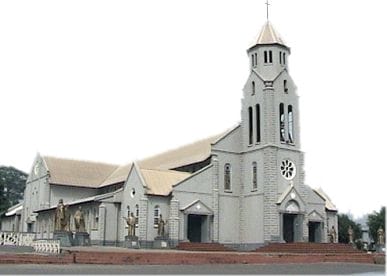 From Onitsha, Nigeria, a report about a prayer service that was held in the churchyard of the Basilica of the Most Blessed Holy Trinity, on January 23 with over a hundred Evanglicals, Pentecostals, Catholics and members of autonomous churches, along with two bishops and several priests of different churches in Nigeria. The event was promoted by the Focolare and included representatives from the CCN (non-denominational churches), OAIC (churches and organisations begun in Africa), PFN (Pentecostal churches), CSN (Catholic Church) and ECWA/TEKAN (Evangelical Churches from the west of Africa and Ghana). Some gathered with the music groups, others prepared the programme booklet and others decorated the churchyard. The teaching was given by an Anglican Pastor who like a “clarion call that would wake up the Christians of Nigeria from their sleep” invited us all to “live as the followers of Christ and to work of unity in diversity.” “We prayed with one soul and one mind,” one girl commented. “I felt the warmth of the Spirit in our midst.” A young man: “Watching people from different churches praying together for unity and peace gave me the certainty that unity will happen, because Jesus himself had asked the Father that all would be one.”
From Onitsha, Nigeria, a report about a prayer service that was held in the churchyard of the Basilica of the Most Blessed Holy Trinity, on January 23 with over a hundred Evanglicals, Pentecostals, Catholics and members of autonomous churches, along with two bishops and several priests of different churches in Nigeria. The event was promoted by the Focolare and included representatives from the CCN (non-denominational churches), OAIC (churches and organisations begun in Africa), PFN (Pentecostal churches), CSN (Catholic Church) and ECWA/TEKAN (Evangelical Churches from the west of Africa and Ghana). Some gathered with the music groups, others prepared the programme booklet and others decorated the churchyard. The teaching was given by an Anglican Pastor who like a “clarion call that would wake up the Christians of Nigeria from their sleep” invited us all to “live as the followers of Christ and to work of unity in diversity.” “We prayed with one soul and one mind,” one girl commented. “I felt the warmth of the Spirit in our midst.” A young man: “Watching people from different churches praying together for unity and peace gave me the certainty that unity will happen, because Jesus himself had asked the Father that all would be one.”  From the Focolare’s ecumenical town in Ottmaring, Germany, on the Week of Prayer for Christian Unity, a gathering was held that included 7 Swedish Lutheran pastors, 4 Anglicans, one English Reformed pastor and 7 Catholic priests. The theme was presented by Lutheran bishop Ake di Skara from Sweden, who highlighted how today Jesus is still drawn to the wounds and darkness of humanity, in order to bring it light. With this in mind everyone moved to the nearby Nazi concentration camp of Dachau, which is an emblematic symbol of the mystery of Jesus Forsaken. There were also several visits to significant sites for the Lutheran faithful in Augsburg, concluding with a break at the Catholic church dedicated to St. Moritz, with its striking image of Christ the Saviour who illuminates the world’s darkness. In an atmosphere of such deep sharing, the liturgical celebrations throughout the week took on an altogether unique sacredness. In the end there was a unanimous desire to: “return to the world where Jesus Forsaken is waiting for me.” “The Church has to be where the wounds of the people are to be found.” “When I get home the first thing I’ll do will be to visit the Lutheran pastor next door.” In Matera, Italy, we met up with Cinzia who, since she embraced the spirituality of unity, has been promoting an ecumenical process in her parish in collaboration with a Lutheran pastor: “They’re beautiful evenings and filled with much joy,” she recounts, “in which what comes to light is not what divides us, but what unites us. An ecumenical choir was born from the 1997 Week of Prayer for Christian Unity, which accompanies the different cultural and humanitarian projects we do together. This year, in collaboration with the associations and movements in the city, we held a march for peace and unity with 300 people from different Christian denominations and from other religions. It was another opportunity to experience the ecumenism of life and to express that deep desire for brotherhood that goes beyond the distinctions.” The parish of Santa Maria in Pesaro, Italy, shares an ecumenical friendship with the Orthodox Cathedral of Resita, Romania, thanks to the parish priests and several lay people who live the spirituality of unity. “This year,” one Romanian Orthodox teenager recounts, “we wanted to take a further step. The young people wanted to be involved in the formation of the children, so we began a course in Pesaro for Catholic and Orthodox animators together where we experience our unity in diversity.” In Cochabamba, Bolivia, the Week of Prayer for Christian Unity was also celebrated by the different movements, including the Focolare. Members of the Anglican, Methodist and Catholic Churches took part in an ecumenical prayer service, with the emeritus bishop who remembered the 500th anniversary of the Reformation and invited everyone to embrace mercy and a renewed commitment to work for unity. See also: Ecumenismo: Settimana dell’unità Settimana dell’unità a L’Avana
From the Focolare’s ecumenical town in Ottmaring, Germany, on the Week of Prayer for Christian Unity, a gathering was held that included 7 Swedish Lutheran pastors, 4 Anglicans, one English Reformed pastor and 7 Catholic priests. The theme was presented by Lutheran bishop Ake di Skara from Sweden, who highlighted how today Jesus is still drawn to the wounds and darkness of humanity, in order to bring it light. With this in mind everyone moved to the nearby Nazi concentration camp of Dachau, which is an emblematic symbol of the mystery of Jesus Forsaken. There were also several visits to significant sites for the Lutheran faithful in Augsburg, concluding with a break at the Catholic church dedicated to St. Moritz, with its striking image of Christ the Saviour who illuminates the world’s darkness. In an atmosphere of such deep sharing, the liturgical celebrations throughout the week took on an altogether unique sacredness. In the end there was a unanimous desire to: “return to the world where Jesus Forsaken is waiting for me.” “The Church has to be where the wounds of the people are to be found.” “When I get home the first thing I’ll do will be to visit the Lutheran pastor next door.” In Matera, Italy, we met up with Cinzia who, since she embraced the spirituality of unity, has been promoting an ecumenical process in her parish in collaboration with a Lutheran pastor: “They’re beautiful evenings and filled with much joy,” she recounts, “in which what comes to light is not what divides us, but what unites us. An ecumenical choir was born from the 1997 Week of Prayer for Christian Unity, which accompanies the different cultural and humanitarian projects we do together. This year, in collaboration with the associations and movements in the city, we held a march for peace and unity with 300 people from different Christian denominations and from other religions. It was another opportunity to experience the ecumenism of life and to express that deep desire for brotherhood that goes beyond the distinctions.” The parish of Santa Maria in Pesaro, Italy, shares an ecumenical friendship with the Orthodox Cathedral of Resita, Romania, thanks to the parish priests and several lay people who live the spirituality of unity. “This year,” one Romanian Orthodox teenager recounts, “we wanted to take a further step. The young people wanted to be involved in the formation of the children, so we began a course in Pesaro for Catholic and Orthodox animators together where we experience our unity in diversity.” In Cochabamba, Bolivia, the Week of Prayer for Christian Unity was also celebrated by the different movements, including the Focolare. Members of the Anglican, Methodist and Catholic Churches took part in an ecumenical prayer service, with the emeritus bishop who remembered the 500th anniversary of the Reformation and invited everyone to embrace mercy and a renewed commitment to work for unity. See also: Ecumenismo: Settimana dell’unità Settimana dell’unità a L’Avana
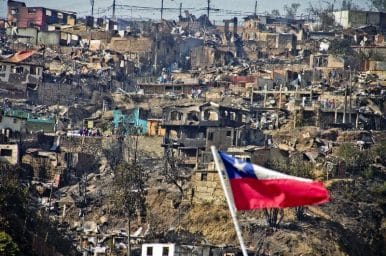
Feb 3, 2017 | Focolare Worldwide, Senza categoria
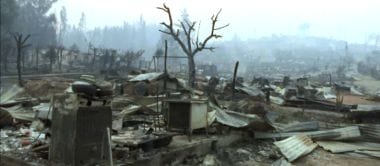 It has been a month since central south Chile has been gripped by wildfires that have swept away half a million of hectares of forest land. Eleven have died and 1,100 have been displaced. Thousands of homes have been burned, mostly in Santa Olga 500 km south of Santiago, a region of 5000 inhabitants that was completely destroyed. The causes of the catastrophe vary: a heat wave with historic temperatures, the dry weather, the intense drought and the winds that have fed the hundreds of fires that broke out in the Andes, backbone of the Americas. It happened within the mountain chain between the Pacific and the Andes that makes the geography of this land very difficult to travel. Some forty air tankers and helicopters and more than 4,500 fire fighters were not able to control so many fronts. Two fully equipped air giants are also at work against the fire: a Boeing 747 Supertanker capable of spreading about 70,000 litres of different liquids, and an Ilyushin-76 that was made available by the Russian government and is capable of launching 30 tons of water. Fire crews have been sent from Argentina, Colombia, Brazil, Peru, Spain, Portugal, France and Venezuela. The number of natural disasters between 2010 until now has been striking, beginning with the 8.8 earthquake followed by a tsunami that caused 535 deaths and millions of Euros in damage. At least three large volcanic eruptions followed all that. In 2015 a new earthquake registered 8.4 on the Richter scale . . . In 2014 and this year wildfires struck the areas around Valparaiso, a port city 115 km from the capital. There were many victims and damages into the 4 millions. It seemed impossible, but in 2015 there was the flooding of the Atacama Desert, the most arid place on earth. The mire carried away entire villages, roads, bridges and 28 people. And now there are more wildfires fanned by the drought… There will be time for investigations into the cause and, in some places, fraud has not been ruled out. But now is time for action. The flames have not been able to devour the solidarity that has been set in motion in so many ways: collections of basic goods, the Hogar de Cristo organization that has launched a 1.8 million dollar fundraiser for rebuilding, and others who have taken on the cost of the Supertanker. One mother who coordinates a collection among families said: “They’re our brothers and sisters, we have to help.” Only a few houses have been left standing in Santa Olga, but a Chilean flag appears over the smouldering rubble, an unfailing sign in the midst of the destruction. It stands for rebuilding and turning to nature again for a place to live, work and fulfil dreams. These souls will work hard with that age old patience of those who create their own history with sweat and tears, enveloped in a natural environment that has nothing to offer them. Alberto Barlocci Latest news from Focolare communities in regions that were hit by the wildfires Marilyn and Juan report: “It’s already been 19 days since, with the help of countries from around the world, we have been fighting against wildfires in south central Chile where many Focolare communities are located. Now, after a superhuman effort, because of the strong winds more than 80 wildfires that are still burning are reigniting fires that had already been put out. Several villages where many F
It has been a month since central south Chile has been gripped by wildfires that have swept away half a million of hectares of forest land. Eleven have died and 1,100 have been displaced. Thousands of homes have been burned, mostly in Santa Olga 500 km south of Santiago, a region of 5000 inhabitants that was completely destroyed. The causes of the catastrophe vary: a heat wave with historic temperatures, the dry weather, the intense drought and the winds that have fed the hundreds of fires that broke out in the Andes, backbone of the Americas. It happened within the mountain chain between the Pacific and the Andes that makes the geography of this land very difficult to travel. Some forty air tankers and helicopters and more than 4,500 fire fighters were not able to control so many fronts. Two fully equipped air giants are also at work against the fire: a Boeing 747 Supertanker capable of spreading about 70,000 litres of different liquids, and an Ilyushin-76 that was made available by the Russian government and is capable of launching 30 tons of water. Fire crews have been sent from Argentina, Colombia, Brazil, Peru, Spain, Portugal, France and Venezuela. The number of natural disasters between 2010 until now has been striking, beginning with the 8.8 earthquake followed by a tsunami that caused 535 deaths and millions of Euros in damage. At least three large volcanic eruptions followed all that. In 2015 a new earthquake registered 8.4 on the Richter scale . . . In 2014 and this year wildfires struck the areas around Valparaiso, a port city 115 km from the capital. There were many victims and damages into the 4 millions. It seemed impossible, but in 2015 there was the flooding of the Atacama Desert, the most arid place on earth. The mire carried away entire villages, roads, bridges and 28 people. And now there are more wildfires fanned by the drought… There will be time for investigations into the cause and, in some places, fraud has not been ruled out. But now is time for action. The flames have not been able to devour the solidarity that has been set in motion in so many ways: collections of basic goods, the Hogar de Cristo organization that has launched a 1.8 million dollar fundraiser for rebuilding, and others who have taken on the cost of the Supertanker. One mother who coordinates a collection among families said: “They’re our brothers and sisters, we have to help.” Only a few houses have been left standing in Santa Olga, but a Chilean flag appears over the smouldering rubble, an unfailing sign in the midst of the destruction. It stands for rebuilding and turning to nature again for a place to live, work and fulfil dreams. These souls will work hard with that age old patience of those who create their own history with sweat and tears, enveloped in a natural environment that has nothing to offer them. Alberto Barlocci Latest news from Focolare communities in regions that were hit by the wildfires Marilyn and Juan report: “It’s already been 19 days since, with the help of countries from around the world, we have been fighting against wildfires in south central Chile where many Focolare communities are located. Now, after a superhuman effort, because of the strong winds more than 80 wildfires that are still burning are reigniting fires that had already been put out. Several villages where many F ocolare families are found have been completely evacuated. For several nights locals along with firefighters and volunteers keep watch in order to keep the fire from growing. There are so many experiences of solidarity especially for people who are on the ground, like Manuel and Silvia, Volunteers from the Focolare who live in Chiguayante, an area completely surrounded by the fire. They were forced to evacuate their house because of the impending danger. Together with their children and neighbours they risked their own lives to “clear” the land so that the fire wouldn’t be able to spread. Even though the situation is now under control, there is always a danger that the wind will change direction. Victoria, Jorge and their three children live in Tomè which is also in danger. With their children and other young people they collected basic goods to share with people who have lost everything, and took those goods to the most isolated regions where it is difficult for help to arrive. Father Alex from the Russian Orthodox Church and a great friend of the Focolare, lives in Hualqui, a small village. He celebrates the Holy Mass in Chiguayante where his community is located. The fires took his village with great force and blocked the roadway so that he had to return on foot to assist the people who were still gripped by fear. There have also been experiences of solidarity in the Focolare communities that are far from the fires. The linked up on whatsapp and in just a few days truckloads of help arrived. We are seeing the great capacity of the people to respond in the face of difficulty with resilience and very touching acts of solidarity. It’s powerful to see the beaming smiles of all the people who have helped, and to feel that there is truly “more joy in giving than in receiving.”Before every action, we renew the unity among ourselves so that we will be more prepared to love the people that are in need. Every night at 22:00 we united in prayer to ask for the miracle of rain, and many others unite with us in this prayer.”
ocolare families are found have been completely evacuated. For several nights locals along with firefighters and volunteers keep watch in order to keep the fire from growing. There are so many experiences of solidarity especially for people who are on the ground, like Manuel and Silvia, Volunteers from the Focolare who live in Chiguayante, an area completely surrounded by the fire. They were forced to evacuate their house because of the impending danger. Together with their children and neighbours they risked their own lives to “clear” the land so that the fire wouldn’t be able to spread. Even though the situation is now under control, there is always a danger that the wind will change direction. Victoria, Jorge and their three children live in Tomè which is also in danger. With their children and other young people they collected basic goods to share with people who have lost everything, and took those goods to the most isolated regions where it is difficult for help to arrive. Father Alex from the Russian Orthodox Church and a great friend of the Focolare, lives in Hualqui, a small village. He celebrates the Holy Mass in Chiguayante where his community is located. The fires took his village with great force and blocked the roadway so that he had to return on foot to assist the people who were still gripped by fear. There have also been experiences of solidarity in the Focolare communities that are far from the fires. The linked up on whatsapp and in just a few days truckloads of help arrived. We are seeing the great capacity of the people to respond in the face of difficulty with resilience and very touching acts of solidarity. It’s powerful to see the beaming smiles of all the people who have helped, and to feel that there is truly “more joy in giving than in receiving.”Before every action, we renew the unity among ourselves so that we will be more prepared to love the people that are in need. Every night at 22:00 we united in prayer to ask for the miracle of rain, and many others unite with us in this prayer.”

 For three days, St Joseph’s College transformed into a fraternity experiment. The young students, ages 9 to 18, lived side by side with their professors, their families, as well as many other young people, adults and elderly from other cities. The Mariapolis was organised by members of the local Jos community, as well as other communities like that of Abuja (4 hours away) and Onitsa (12). There were also some young people of the Focolare from Lagos. In Nigeria, a country of seemingly limitless expanses, long trips bristling with danger often need to be overcome. Yet this did not stop anyone from supporting the Mariapolis at St. Joseph’s. The school opened its gates to welcome the young and not so young, students, teachers, workers. Among the Mariapolites was John Maigari, who had once attended and taught at the school. Now retired, Maigari also previously headed the diocese’s department of education. Many years prior he himself had experienced Mariapolis life, where each person sees each other as family to love and to serve. Now after many years, the professor hoped that the students could experience that same lifestyle. His proposal was welcomed.
For three days, St Joseph’s College transformed into a fraternity experiment. The young students, ages 9 to 18, lived side by side with their professors, their families, as well as many other young people, adults and elderly from other cities. The Mariapolis was organised by members of the local Jos community, as well as other communities like that of Abuja (4 hours away) and Onitsa (12). There were also some young people of the Focolare from Lagos. In Nigeria, a country of seemingly limitless expanses, long trips bristling with danger often need to be overcome. Yet this did not stop anyone from supporting the Mariapolis at St. Joseph’s. The school opened its gates to welcome the young and not so young, students, teachers, workers. Among the Mariapolites was John Maigari, who had once attended and taught at the school. Now retired, Maigari also previously headed the diocese’s department of education. Many years prior he himself had experienced Mariapolis life, where each person sees each other as family to love and to serve. Now after many years, the professor hoped that the students could experience that same lifestyle. His proposal was welcomed.  For three days, the school completely changed. Moments of reflection and going in depth were joined with tangible experiences. Divided into groups, students of different ages lived side by side with teachers and those attending, sharing the various moments of the day: cooking, washing dishes, tidying up the meeting hall, cleaning toilets and the school playground. For some it was their first time; they had never done anything like it. Even the school’s principal washed dishes! A large book was prepared for the students to capture their comments. It tells of three days of true living. The retreat changed their lives, they say. “The unity we lived during those days struck us from the very first moment that you set foot in our school.” It was a unity that the words of Chiara Lubich and the witness of the Focolare members had transmitted to them.
For three days, the school completely changed. Moments of reflection and going in depth were joined with tangible experiences. Divided into groups, students of different ages lived side by side with teachers and those attending, sharing the various moments of the day: cooking, washing dishes, tidying up the meeting hall, cleaning toilets and the school playground. For some it was their first time; they had never done anything like it. Even the school’s principal washed dishes! A large book was prepared for the students to capture their comments. It tells of three days of true living. The retreat changed their lives, they say. “The unity we lived during those days struck us from the very first moment that you set foot in our school.” It was a unity that the words of Chiara Lubich and the witness of the Focolare members had transmitted to them.  “I feel really happy and enthusiastic,” writes Nipps, “because these days were wonderful. I experienced many things and was particularly struck by the love and unity that the team of people who ran the program had between them.” “Before my life was incomplete,” says Keivin, “because I didn’t feel at all that God truly existed and was alive. Now I truly believe in God.” “This retreat wasn’t like the others,” adds Daong. “You ate with us and slept at our high school.” In this part of Nigeria, for years there have been many episodes of violence between Christians and Muslims, with seeds of hatred sown across the country. These young students also had lived through this. At the Mariapolis at Jos, they were able to experience an alternative: the firepower of God’s love and unity.
“I feel really happy and enthusiastic,” writes Nipps, “because these days were wonderful. I experienced many things and was particularly struck by the love and unity that the team of people who ran the program had between them.” “Before my life was incomplete,” says Keivin, “because I didn’t feel at all that God truly existed and was alive. Now I truly believe in God.” “This retreat wasn’t like the others,” adds Daong. “You ate with us and slept at our high school.” In this part of Nigeria, for years there have been many episodes of violence between Christians and Muslims, with seeds of hatred sown across the country. These young students also had lived through this. At the Mariapolis at Jos, they were able to experience an alternative: the firepower of God’s love and unity.


 Ugandan business woman Rita Najjingo was among the 1,200 business owners and researchers of economy who were welcomed by Pope Francis on February 4, twenty five years from the start of the
Ugandan business woman Rita Najjingo was among the 1,200 business owners and researchers of economy who were welcomed by Pope Francis on February 4, twenty five years from the start of the 



